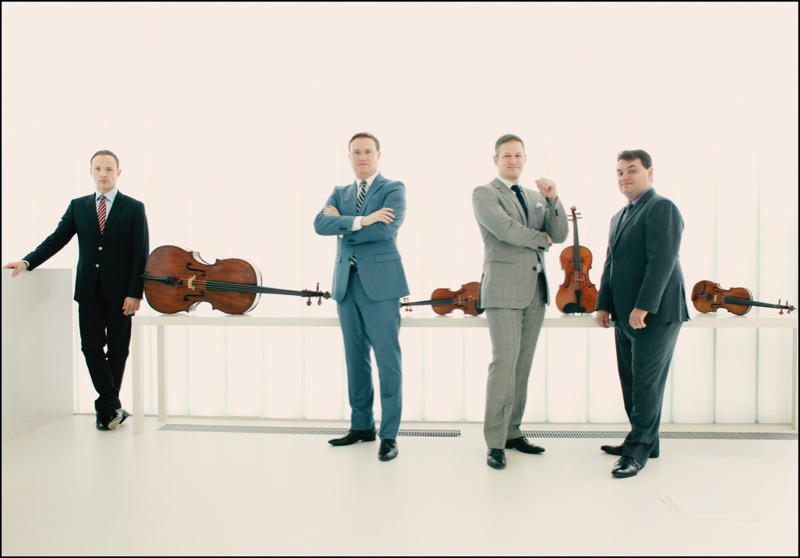
Violist Ori Kam quickly pulled up his program for the Bridgehampton Chamber Music Festival’s spring series and, despite crafting it himself, was pleasantly surprised.
“Debussy, Bartók and Ravel,” he read off. “Oh, nice! Yeah, it’s a very cool program. Usually, the programs we play try to hit the main eras of string quartet repertoire: classical, romantic and 20thcentury. And this, actually, is a 20th-century program.”
What came next was a passion-fueled, borderline-dissertation on the two French composers and those who came before them, with Bartók discovering his own sound decades later.
“I think our program is a statement about globalization in the early 20thcentury, because it really is a program showing that while Bartók is extremely Hungarian — it really doesn’t get more Hungarian than Bartok does — and Debussy and Ravel are extremely French — no one would even consider saying anything even remotely different than that — they both encompass inside of their music so many international influences and so many international material,” Kam said.
“It is an interesting statement to make today,” he continued, “when the world is increasingly more protectionist and nationalistic. And perhaps these composers prove, in a sense, that you can be really, really French and also embrace Spanish and far Eastern and American, and all sorts of other influences.”
Kam turned inward for a moment, during a telephone interview from New York, one day before his flight to Arizona, where he would reunite with his fellow members of the Jerusalem Quartet for the start of their coast-to-coast national tour, which will bring them to the Bridgehampton Presbyterian Church on Sunday, April 14, for their East End debut.
But first, he caught up with The Sag Harbor Expressto discuss his own musical origins and his love for chamber repertoire.
The Sag Harbor Express: When did you first start listening to classical music?
Kam: All of us in the Jerusalem Quartet come from musical families, so we were born into this kind of music. And we all played chamber music from an early age. It was a big part of early on in our musical education.
At age 6, what were you playing?
Kam: Oh God, anything I could get my hands on, actually. I wasn’t playing it very well. My mother played the viola, which actually is not necessarily what drew me to it. But my mother played for many years in the Israel Philharmonic Orchestra. Friday nights, throughout my childhood, she would have friends from the orchestra come over for a potluck dinner and a chamber music party. As a kid, I always loved these Friday nights.
When I was 13, I was allowed to partake, which was a huge thing for me. I think that probably explains it.
What was it like for you, and your mom, to debut in the Israel Philharmonic at age 16?
Kam: I don’t think anything makes my mom happier than hearing her kids play. She’s not a stage mother; she didn’t push us. I think it was important for her that we play an instrument more as a general education. But my mom absolutely loves music, and I think for any parent to be able to share a passion with her kids is something really unique and special. And I know I feel very lucky to be able to share this passion with my mother.
What about the viola resonated with you at that age?
Kam: Viola is a real chamber music instrument. It’s in the middle of the register, it’s almost like all the music happens around it, and it’s the center of the music. It’s also a very diverse instrument, in terms of the role it plays in a chamber group. It can play the bass part, it can play the melody, it can play accompaniment, it can play counter melody. I think for that reason, a lot of the great composers, like Mozart and Haydn and Beethoven, when they played chamber music, they played the viola part.
And I think of all the string instruments, it is the instrument that is closest to the human voice, in its range and its timbre. I’ve always loved vocal music, so I think that’s the reason I was drawn to it.
Do you feel the Jerusalem Quartet itself speaks to the globalization theme of the program?
Kam: That is a hard question to answer. We are all Israeli of different origins. Israel is a very multi-cultural country, in a way, even though its magnetic core is, of course, Judaism. But we have different religions and different Jews that come from all over the world, and even inside of our minority religious communities, there is a lot of diversity.
But in a sense, that is true for almost all countries in the developed world today, so I think that in a way, we’re living the dream of those composers, the fruition of their dream. They dreamed the world would one day look the way it does today, where we can cross borders and we can immigrate easily — relatively easily — and cross-pollinate each other with a lot of ideas and expose each other to a lot of differences and enjoy the abundance and richness of human creativity, which is really extraordinary when you come to think about it.
The Jerusalem Quartet, comprised of violinists Alexander Pavlovsky and Sergei Bresler, violist Ori Kam, and cellist Kyril Zlotnikov, will perform a program of Debussy, Bartók and Ravel on Sunday, April 14, at 5 p.m. at the Bridgehampton Presbyterian Church, located at 2429 Montauk Highway in Bridgehampton, as part of BCMF Spring 2019. The series will conclude with a program of German Baroque Masterpieces on Saturday, May 11, at 5 p.m.
Tickets are $40 or $60, and $10 for students. For more information, call (917) 940-2983 or visit bcmf.org.